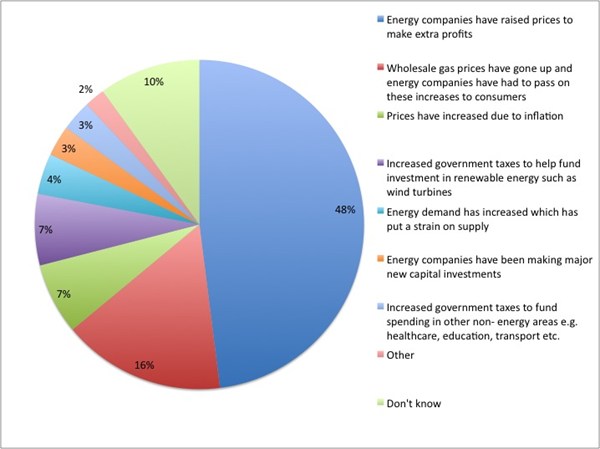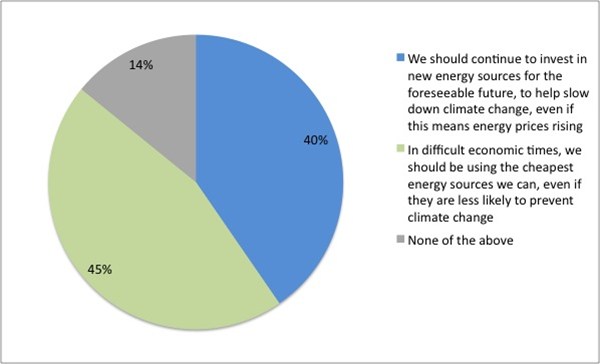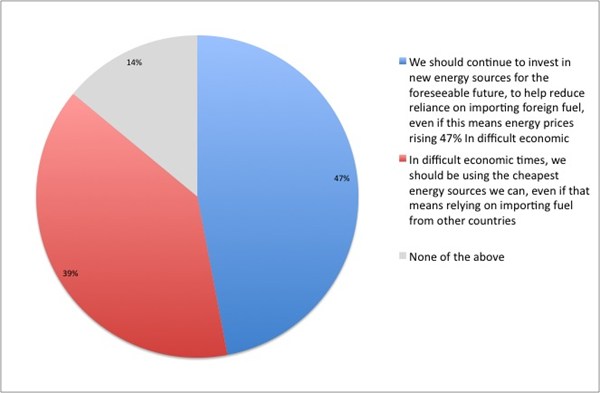UK public blames energy companies for higher bills; is split over paying more for climate change and energy security
Posted in Climate Sock on March 28th, 2013 by Leo – Comments Off on UK public blames energy companies for higher bills; is split over paying more for climate change and energy securityThis is the second in the series of posts presenting results from Carbon Brief’s energy and climate change polling. It was written by Christian Hunt and Ros Donald of Carbon Brief and was originally posted here.
Energy bills are going up, and new government analysis which examines why has reignited media attention over the price consumers pay for environmental and social policies. But despite media coverage of ‘green taxes’ on energy bills over the past two years, new polling indicates people place the blame for rising costs at the door of energy companies.
Polling conducted for Carbon Brief by Opinium indicates 48 per cent of around 2,000 respondents believe the main reason energy bills have gone up over the past few years is that energy companies have raised prices to make bigger profits.
What’s pushing energy bills up?
We’ve written a lot about energy costs – and especially how much government policies aimed at cutting carbon emissions are adding to them – over the past two years. The last two years have seen a determined campaign by the right wing press to link rising energy bills to the government’s green policies.
This has sometimes led to exaggerated claims about the effect of environmental policies on energy bills, and the size of the claimed contribution – as well as the method for calculating it – has varied considerably. More recently the government has tried to pre-empt criticism by breaking down the cost of financing green measures like renewables, presenting them alongside other costs such as wholesale gas prices – which remain the biggest reason for recent price hikes.
We wanted to know if media coverage of ‘green taxes’ has affected people’s opinions, so we surveyed a sample of 2,000 people to find out what they thought was contributing most to rising household energy bills – and to ask what policies consumers are willing (or otherwise) to pay for.
Asked what they think is the main reason for the increases in consumer gas and electricity prices over the last 12 months, just under half – 48 per cent – put the blame at the door of energy companies. This result is consistent with a recent poll commissioned – but not published – by the Sunday Times last October. In that poll, 58 per cent said energy company profits were the biggest contributor to higher energy bills.

Question: What do you think is the main reason for the increases in consumer gas and electricity prices over the last 12 months?
The second most common reason people cited was a rise in wholesale gas prices – 16 per cent said this was the most important reason why bills are going up. Wholesale gas costs contributed £390 to the average gas bill of £830 according to Ofgem’s figures for this month.
Meanwhile, seven per cent of respondents put the hike down to rising inflation, and another seven per cent blamed increased government taxes to help fund investment in renewable energy such as wind turbines.
What would you pay for green policies?
We also wanted to examine the extent to which people felt the government should prioritise spending on policies focused on cutting carbon emissions, and initiatives aimed at increasing the UK’s energy security.
The polling found a fairly even split between people who would pay more for climate change policies and those who would prefer not to.
40 per cent of respondents said the government should continue to invest in new energy sources for the foreseeable future, to help slow down climate change, even if this means energy prices rising. Meanwhile, 45 per cent said that in difficult economic times, we should be using the cheapest energy sources we can, even if they are less likely to prevent climate change.

Question: Which of the following statements regarding energy sources do you agree with most?
Conservative voters appeared to be the most likely to support using the cheapest source of fuel: 52 per cent said they supported the cheapest fuels even if they are less likely to prevent climate change – versus 38 per cent of Conservative voters who said they would be willing to pay more for fuels that would help slow down climate change.
40 per cent of Labour voters said they’d pay more, in contrast to 49 per cent who said we should stick to the cheapest fuel source. Lib Dems were most likely to support investment in low carbon energy, even if it led to higher costs; 32 per cent said the government should choose the cheapest fuel source.
Energy security
If the question was about maintaining energy security rather than addressing climate change slightly more people appeared to be willing to pay more. 47 per cent of respondents agreed that the government should invest in new energy sources for the foreseeable future, to help reduce reliance on importing foreign fuel, even if this means energy prices rising.
In contrast, 39 per cent said the UK should use the cheapest sources of fuel, even if it means the country is more reliant on fuel imports.

Question: Which of the following statements regarding energy sources do you agree with most?

